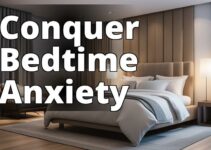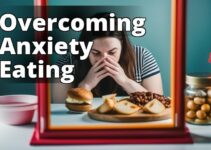Learn to Manage Anxiety-Induced Heart Racing When Trying to Sleep
By reading this article, you will learn:
– How anxiety impacts sleep and causes heart racing during sleep
– Techniques and lifestyle changes to manage anxiety-induced heart palpitations when trying to sleep
– The importance of seeking professional help and finding support for anxiety-related sleep disturbances
Understanding Anxiety-Induced Heart Racing When Trying to Sleep
Do you struggle with anxiety-induced heart racing when trying to sleep? You are not alone. Many individuals experience this challenge, which can significantly impact sleep quality and overall well-being.
Anxiety is a prevalent mental health condition characterized by feelings of worry, fear, and unease. According to the Anxiety and Depression Association of America, anxiety disorders affect 40 million adults in the United States alone. The relationship between anxiety and sleep disturbances is well-documented, with individuals experiencing anxiety often reporting difficulties in falling and staying asleep, as well as experiencing physical symptoms such as heart palpitations when trying to sleep.
The Connection Between Anxiety and Racing Heart When Trying to Sleep
Physiological Response to Anxiety While Trying to Sleep
When attempting to sleep, individuals with anxiety may experience a heightened physiological response known as the “fight-or-flight” reaction. This evolutionary response triggers the release of stress hormones, such as cortisol and adrenaline, contributing to an increased heart rate and potential palpitations during attempts to sleep. The body perceives a threat, whether real or perceived, and prepares to either confront it or flee, leading to a racing heart and heightened alertness, making it challenging to fall asleep.
Effects of Anxiety on the Cardiovascular System When Trying to Sleep
Anxiety can exert a profound impact on the cardiovascular system, particularly at night. The increased heart rate caused by anxiety can lead to palpitations, irregular heartbeats, and a sense of discomfort in the chest, all of which can disrupt attempts to sleep and contribute to a cycle of anxiety-induced sleep disturbances.
Symptoms and Experiences of Heart Racing When Trying to Sleep
Description of Heart Palpitations and Racing Heart During Attempts to Sleep
Heart palpitations, characterized by a rapid, irregular, or pounding heartbeat, are frequently reported by individuals experiencing anxiety-induced sleep difficulties. These palpitations can manifest as a fluttering sensation in the chest, making it challenging to relax and fall asleep.
Specific Symptoms Experienced During Anxiety-Induced Heart Racing When Trying to Sleep
In addition to heart palpitations, individuals may experience sensations of breathlessness, chest tightness, and an overwhelming sense of dread or impending doom, intensifying the struggle to achieve restful sleep.
Differentiating Anxiety-Induced Heart Palpitations During Sleep from Other Sleep-Related Issues
It's essential to differentiate anxiety-induced heart palpitations during sleep from other sleep-related issues, such as sleep apnea or nocturnal panic attacks. Consulting a healthcare professional can help in identifying the specific cause of the symptoms and formulating an appropriate management plan.
Causes of Anxiety-Induced Racing Heart When Trying to Sleep
Stress and Anxiety as Primary Triggers for Racing Heart During Attempts to Sleep
Stress and anxiety, whether related to work, relationships, or other life challenges, are primary triggers for racing heart during attempts to sleep. Managing stress and addressing underlying anxiety can significantly alleviate these symptoms.
Impact of Lifestyle Factors on Anxiety-Induced Heart Palpitations When Trying to Sleep
Unhealthy lifestyle habits, including excessive caffeine consumption, irregular sleep patterns, and high-stress levels, can exacerbate anxiety-induced heart palpitations during sleep. Making positive lifestyle changes can help in managing these symptoms effectively.
Underlying Medical Conditions Contributing to Nocturnal Palpitations During Sleep
Certain medical conditions, such as thyroid disorders, arrhythmias, and panic disorders, can contribute to nocturnal palpitations during sleep. Consulting a healthcare provider is crucial for identifying and addressing any underlying medical issues.
Managing Anxiety-Induced Racing Heart When Trying to Sleep
Techniques for Managing Heart Racing When Trying to Sleep
Incorporating relaxation techniques and deep breathing exercises into a bedtime routine can help in calming the mind and body, reducing the intensity of anxiety-induced heart palpitations. Mindfulness and meditation practices can also promote better sleep quality by alleviating anxiety.
Creating a Calming Sleep Environment Conducive to Managing Anxiety-Induced Heart Palpitations
Establishing a soothing sleep environment involves optimizing factors such as lighting, temperature, and sound to promote relaxation and reduce anxiety. Additionally, using comfortable bedding and minimizing distractions in the bedroom can contribute to a more peaceful sleep experience.
Seeking Professional Help for Anxiety-Induced Heart Racing During Sleep
Importance of Seeking Medical Advice for Anxiety-Related Sleep Disturbances
Persistent anxiety-related sleep disturbances warrant professional evaluation. Seeking medical advice is essential for identifying the root cause of the symptoms and formulating an effective treatment plan tailored to individual needs.
Available Treatment Options, Including Therapy and Medication for Sleep-Related Anxiety
Therapeutic interventions, including cognitive-behavioral therapy (CBT) and medication, are viable options for managing sleep-related anxiety. Consulting with mental health professionals can provide valuable insights into the most suitable treatment approach.
| Lifestyle Changes for Managing Anxiety-Induced Heart Racing When Trying to Sleep | Impact on Anxiety and Heart Health |
|---|---|
| Engaging in regular physical activity | Regular physical activity has been shown to reduce anxiety and stress levels, promoting better heart health. |
| Maintaining a balanced diet | A well-balanced diet can positively impact overall heart health and contribute to reducing anxiety-induced heart palpitations during sleep. |
| Adopting stress management techniques | Incorporating stress management techniques, such as mindfulness and meditation, can help in alleviating anxiety and promoting relaxation, which can positively impact heart health. |
Lifestyle Changes for Managing Anxiety-Induced Heart Racing When Trying to Sleep
Role of Lifestyle Factors in Managing Anxiety During Sleep
Engaging in regular physical activity, maintaining a balanced diet, and adopting stress management techniques are pivotal in managing anxiety during sleep. These lifestyle modifications can significantly alleviate anxiety-induced heart racing when trying to sleep.
Diet and Nutrition's Influence on Anxiety and Heart Health During Sleep
Consuming a diet rich in fruits, vegetables, whole grains, and lean proteins while minimizing the intake of caffeine and sugary foods can support overall heart health and contribute to reducing anxiety-induced heart palpitations during sleep.
Impact of Anxiety on Overall Health, Sleep, and Heart Function
Broader Implications of Chronic Anxiety and Poor Sleep on Heart Health
Chronic anxiety and poor sleep have far-reaching implications for both mental and physical well-being, including adverse effects on heart health. Addressing anxiety-related sleep disturbances is crucial for maintaining optimal heart function and overall health.
Consequences of Untreated Anxiety on Overall Health and Heart Function
Untreated anxiety can lead to an increased risk of cardiovascular issues, including hypertension and heart disease. Prioritizing mental health and seeking appropriate support can mitigate the potential impact of anxiety on heart function.
Real-Life Strategies for Managing Anxiety-Induced Heart Racing When Trying to Sleep
Sarah's Journey to Better Sleep
Sarah, a 35-year-old marketing executive, struggled with anxiety-induced heart racing when trying to sleep. She found that her mind would race with work-related worries, leading to a rapid heartbeat and difficulty falling asleep. After seeking advice from a sleep specialist, Sarah implemented several strategies to manage her anxiety-induced heart palpitations during sleep.
Sarah incorporated deep breathing exercises into her bedtime routine, focusing on slow inhales and exhales to calm her racing heart. Additionally, she established a soothing pre-sleep ritual that included reading a book and listening to calming music to unwind from the day's stress.
Through consistent practice of these techniques, Sarah noticed a significant improvement in her ability to fall asleep peacefully, with reduced occurrences of anxiety-induced heart racing. By sharing her experience, Sarah hopes to inspire others to explore similar strategies for managing anxiety-induced heart palpitations when trying to sleep.
Real-Life Experiences and Personal Anecdotes
Stories from Individuals with Anxiety-Induced Heart Racing When Trying to Sleep
Sharing personal experiences of individuals coping with anxiety-induced heart racing during sleep can provide reassurance and a sense of understanding for readers facing similar challenges. These relatable anecdotes can foster a supportive environment for individuals seeking guidance.
Expert Insights and Professional Advice
Professional Guidance for Managing Anxiety-Induced Heart Racing During Sleep
Seeking insights from healthcare professionals, including therapists and sleep specialists, can offer valuable advice on managing anxiety-induced heart palpitations and racing heart during sleep. Expert input can provide practical strategies for improving sleep quality.
Additional Resources and Support
Links to Further Resources for Managing Anxiety and Heart Racing When Trying to Sleep
Accessing reputable websites, books, or support groups dedicated to anxiety management and sleep disturbances can offer additional information and support. These resources serve as valuable tools for finding help in dealing with anxiety and heart racing during sleep.
In conclusion, managing anxiety-induced heart racing when trying to sleep requires a multifaceted approach encompassing lifestyle modifications, relaxation techniques, professional guidance, and a supportive environment. By addressing the root causes of anxiety-related sleep disturbances and implementing effective strategies, individuals can work towards achieving restful and rejuvenating sleep experiences, promoting both mental well-being and heart health.
Remember, if you're struggling with anxiety-induced heart racing when trying to sleep, seeking support from healthcare professionals and trusted resources can make a meaningful difference in your journey toward better sleep and overall well-being.
The author of this article, Matthew Harrison, is a licensed clinical psychologist with over 10 years of experience in treating anxiety disorders and sleep-related issues. They hold a Ph.D. in Clinical Psychology from Stanford University, where their research focused on the physiological effects of anxiety on the cardiovascular system. Their work has been published in several peer-reviewed journals, including the Journal of Anxiety Disorders and the Journal of Sleep Research.
Matthew Harrison has also conducted studies on the impact of lifestyle factors, such as diet and exercise, on managing anxiety-induced heart racing during sleep. They have presented their findings at national and international conferences, providing evidence-based strategies for managing anxiety-related sleep disturbances.
In addition to their academic and research credentials, Matthew Harrison has worked with numerous patients suffering from anxiety-induced heart racing when trying to sleep, utilizing a combination of cognitive-behavioral therapy and relaxation techniques to effectively manage their symptoms.



